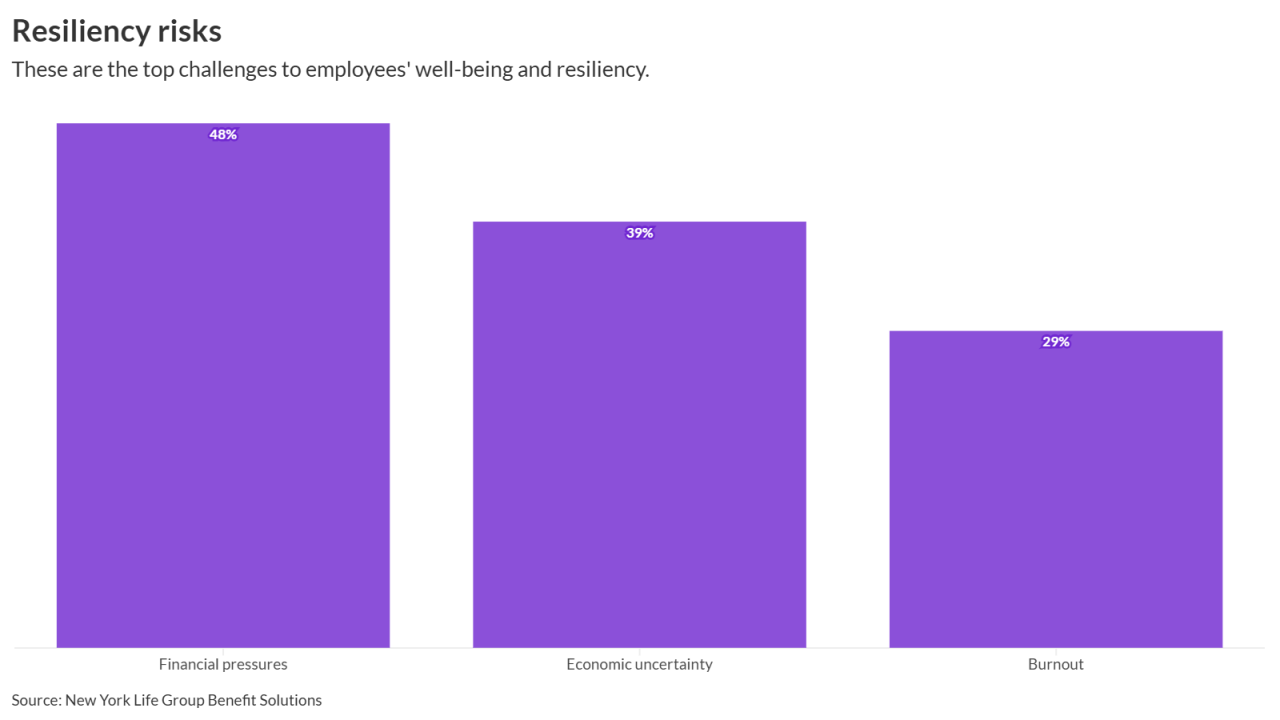While weight loss is a common
According to KFF, just 18% of companies with 200 or more employees cover GLP-1 drugs, a class of medications that reduce blood sugar levels and regulate appetite. Given that these drugs cost $700 to $1,400 a month without insurance, they can pose a financial hardship for employers and employees alike. However, more companies may consider adding coverage despite the costs in hopes of helping employees prevent and manage chronic conditions like obesity and diabetes.
"We truly have the tools to create prevention," said Dr. Tim Church, chief medical officer at weight management program provider Wondr Health. "And isn't it about time we start shifting the healthcare dollar from treatment to prevention?"
Read more:
The cost of
Learn more about how employers can build preventative healthcare benefits centered on GLP-1s and weight loss.
Consider all the costs of adding GLP-1 coverage
Glucagon-like peptide-1 (GLP-1) medications are doing more than transforming waistlines and blood sugar levels — they're redefining corporate culture.
As employers grapple with including GLP-1s in their benefits packages, they face a complex decision that boils down to two main factors: human resources and finance. On one side, there's the potential for improved employee health and productivity. On the other, employers face significant costs and implementation challenges.
Navigating this terrain requires a delicate balance of fiscal responsibility and commitment to employee well-being.
Read more:
Incorporate behavioral changes for diabetes and obesity
The rising popularity of GLP-1 drugs like Ozempic and Wegovy as a weight-loss solution has tempted many employers to exclude the medications from their plans — as it stands, only 25% of employers cover GLP-1s, according to healthcare navigation company Accolade. While GLP-1s generally refer to a class of drugs that help manage glucose levels in people with type 2 diabetes, the drugs became known as an expensive celebrity weight loss drug after big names like Oprah Winfrey and Elon Musk sang Ozempic's praises. However, it's not a medication that just any employee can take on a whim to lose weight.
Typically, a patient needs to either have type 2 diabetes or obesity to qualify for a prescription. Meanwhile, a monthly supply of a GLP-1 can cost as much as $1,350 before rebates or insurance. GLP-1s are an investment for both employers and employees, but it might be a worthwhile one with the right guidance in place, says Kristin Hall, VP of clinical programs and patient experience at apree health, a healthcare navigation company.
"There's no debating the GLP-1 medications have a ton of great proven outcomes for people with diabetes and people with obesity," says Hall. "But the unit price of these drugs is substantially high in the United States. It's essential for employers to focus on behavior change alongside medication so employees can reach their goals."
Read more:
Understand GLP-1's shouldn't be used long-term
Wondr Health, a weight management program provider, surveyed over 700 employees across 50 organizations about which factors are most important to consider when taking weight-loss medications: Lifestyle guidance ranked first with 78% of the votes, followed by medical guidance, overall effectiveness and potential side effects.
"It looks like employees really care about lifestyle changes, which makes me happy because it means they know what's critical to the success of these medications," says Dr. Tim Church, chief medical officer at Wondr Health. "These medications are not one-and-done, but an important tool in the toolbox."
Surprisingly, the cost did not make it into the top five concerns, with 57% voting it as the most important factor. This may hint to employees knowing they have employer support rather than thinking they have to buy it out-of-pocket. Dr. Church notes that FDA approval ranked even lower, at 39%, hinting at possible mistrust of the agency. Implications for long-term use ranked last, which for Dr. Church is actually good news.
"They're not concerned about these medications being used for long-term use because they shouldn't be used long-term," he says. "So I see that as a positive."
Read more:
Offer dietician benefits to improve health and lower benefit costs
According to research from the Harvard T.H. Chan School of Public Health, people who improved the health of their diet by even 25% could reduce their risk of dying from cancer by up to 18%, reduce the risk of dying from heart disease by up to 13%, and reduce risk of respiratory disease by up to 46%. But it's not easy to build a healthy diet employees would actually want to stick to, at least not without some help. That's where dietitians come in.
Marathon Health, which gives employers access to local networks of primary care and mental health providers, includes registered dietitians on their care teams. This means employees have the same level of access to dietitians as they do to other primary care physicians.
"Nutrition is the baseline of all health," says Monica McCorkle, director of health coaching and nutrition services at Marathon Health. "You can have a pill prescribed to you by a doctor to manage something like diabetes, but what you eat is important. It affects the outcome."
Read more:
Remember weight loss and mental health go hand in hand
Obesity is associated with increased odds of mood and anxiety disorders, including more serious mental health conditions such as schizophrenia and bipolar disease. Mental health challenges in many ways impact a person's behavioral health, as well as their ability to lose weight. Stress can lead to emotional eating, which can be reduced by developing healthy coping strategies. Depression manifests as a lack of motivation and low energy, which can make exercise more difficult. Binge eating behavior can lead to over-eating and circumventing GLP-1 effects. All of these factors limit weight loss on treatment and can lead to weight regain.
Read more:





